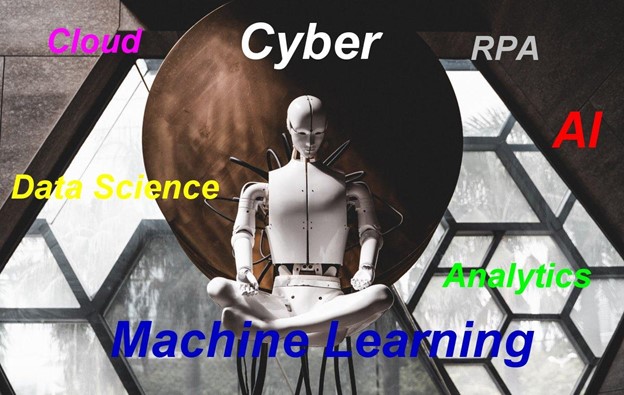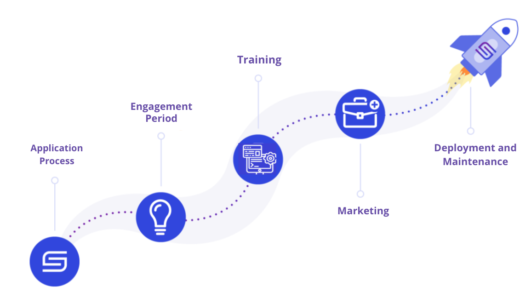
The landscape of technology careers continues to evolve. It’s no longer a matter of choosing between programming languages such as JavaScript, Java, and .Net. Whole new technology careers are opening. Here, Smoothstack reviews our top five emerging technologies that are likely to be dominating careers in the years ahead.
Cybersecurity
Cybersecurity events are no longer viewed simply as data breaches. They have escalated to attacks. Stealing data and credit card numbers have escalated to taking over systems and holding organizations and their data hostage in exchange for large sums of money. It is estimated that cybercrime will cost companies over $6 trillion just in 2021. Targets have changed from banks and large retailers to key infrastructure providers such as pipelines, utilities, and food processing facilities. Anyone can become a target. How much would it be worth to you to have all your family photos returned to you after being encrypted by a hacker? Or worse, regaining control of medical devices for someone on life support. These are just some of the cyber scenarios that are plaguing our world today. With over 3.5 million cybersecurity jobs to fill in 2021, there are lots of opportunities.
Artificial Intelligence (AI) and Machine Learning (ML)
Not too long ago, Dick Tracy was the only person talking to his watch. Today not only can you speak to your watch, but you can also talk with your watch, thanks to artificial intelligence. Autocorrect when you are texting or suggestions when you are typing in most mail, and word processing systems are all common uses of artificial intelligence. Most of us have benefited from emerging technologies and machine learning with Waze or Google maps when it tells us how long it will take us to get somewhere. Machine learning is also responsible for your phone knowing what to do when you take a picture of a check to deposit. The two concepts work hand in hand to make computers more human-like and human-friendly. Artificial intelligence and machine learning will continue to become more common as they automate tasks in transcription, translation, accounting, medicine, customer service, and many more areas.
Data Science and Analytics
If you love combing through mountains of data, a career in Data Science and Analytics may be for you. It was not too long ago that the computing power to analyze a lot of the data was only available to certain government agencies. The same technologies that have allowed the human genome to be sequenced also enable online retailers to anticipate products you might like. Data scientists organize data so that it can be used effectively by organizations. They are usually the first to identify trends that others can leverage. Data analysts are more like historians, pulling lessons from the data. This helps a company be more efficient and profitable. Data is increasingly important in medicine, climate studies, consumer products, and more. It’s a great time to jump into Data Science and Analytics.
Robotic Process Automation (RPA)
Robotic Process Automation brings a lot of technologies together all at once. Sometimes it is simply referred to as software robots. It may be cloud-based and leverage both Artificial Intelligence and Machine Learning to automate processes. There are lots of benefits of RPA. Robotic processes increase productivity, reliability, consistency, and accuracy. It also improves compliance with regulatory requirements. Popular uses of RPA include customer service, accounting, financial services, healthcare, human resources, and supply chain management. Careers in RPA can involve business process analysis, RPA engine development, and RPA configuration.
Cloud
Almost all our applications are starting to move to the cloud. Google, Microsoft, and Amazon are just some of the cloud providers who have taken advantage of emerging technologies. Companies are also setting up their own private cloud infrastructures. Developing and maintaining cloud applications requires a diverse team of specialists.
Cloud architects build the cloud infrastructure and make sure that it can integrate with various functions. Cloud administrators develop, enforce and update access policies. They also establish security protocols and procedures, monitor and ensure uptime, and assess the need for technology updates. Cloud security analysts make sure the company or user is safe from cyberattacks.
Software engineers continue to develop new software that functions entirely in the cloud instead of on your computer. Adobe and Google offer an impressive suite of apps that can operate in the cloud. Spotify gives you access to all the music in the world and runs in Google’s cloud. The goal is to be able to operate anything from anywhere, and the cloud offers that.
If you would like to learn more about a career in any of the emerging technology areas, reach out to Smoothstack for more information.



